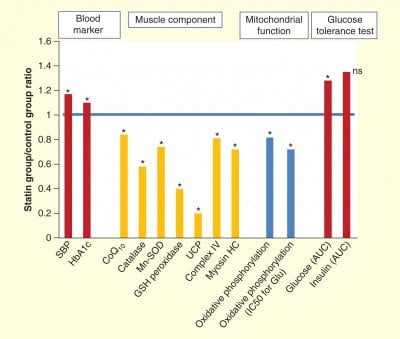View attachment 532
Statin Drugs Markedly Inhibit Testosterone Production by Rat Leydig Cells in Vitro: Implications for Men
Reproductive Toxicology
Available online 22 January 2014
Highlights
•Statins cause significant reductions in LH-stimulated testosterone production by rat Leydig cells; possible human relevance.
•Statin induced inhibition in testosterone production was bypassed by providing pregnenolone or progesterone.
•Bypassing the site of action with pregnenolone resulted in greater LH stimulated testosterone production than progesterone.
•LH responsiveness of Leydig cells was only maintained when progesterone was used to bypass the site of action.
Abstract
Statin drugs lower blood cholesterol by inhibiting hepatic 3-hydroxy-3-methylglutaryl-Coenzyme-A reductase. Statins are known to inhibit sterol production in the testis, but effect of statins on testosterone production has not been studied critically in vitro and clinical data are controversial. We measured 18-hour testosterone production in vitro, using highly purified rat Leydig cells exposed to atorvastatin, mevastatin, or simvastatin and also determined if statin-induced inhibition of testosterone production could be bypassed with substrate distal to cholesterol. Statins had no effect on testosterone production during culture without LH. However, with 10 ng/mL LH, testosterone production was 12-fold higher and markedly inhibited (-40%) by statin. Leydig cells provided sub-saturating pregnenolone or progesterone to bypass the site of statin action, maintained LH-stimulated testosterone production at or above amounts observed with LH stimulation and no statin. Pregnenolone resulted in greater testosterone production, but LH responsiveness was lost. With progesterone, LH responsiveness was maintained.
Statin Drugs Markedly Inhibit Testosterone Production by Rat Leydig Cells in Vitro: Implications for Men
Reproductive Toxicology
Available online 22 January 2014
Highlights
•Statins cause significant reductions in LH-stimulated testosterone production by rat Leydig cells; possible human relevance.
•Statin induced inhibition in testosterone production was bypassed by providing pregnenolone or progesterone.
•Bypassing the site of action with pregnenolone resulted in greater LH stimulated testosterone production than progesterone.
•LH responsiveness of Leydig cells was only maintained when progesterone was used to bypass the site of action.
Abstract
Statin drugs lower blood cholesterol by inhibiting hepatic 3-hydroxy-3-methylglutaryl-Coenzyme-A reductase. Statins are known to inhibit sterol production in the testis, but effect of statins on testosterone production has not been studied critically in vitro and clinical data are controversial. We measured 18-hour testosterone production in vitro, using highly purified rat Leydig cells exposed to atorvastatin, mevastatin, or simvastatin and also determined if statin-induced inhibition of testosterone production could be bypassed with substrate distal to cholesterol. Statins had no effect on testosterone production during culture without LH. However, with 10 ng/mL LH, testosterone production was 12-fold higher and markedly inhibited (-40%) by statin. Leydig cells provided sub-saturating pregnenolone or progesterone to bypass the site of statin action, maintained LH-stimulated testosterone production at or above amounts observed with LH stimulation and no statin. Pregnenolone resulted in greater testosterone production, but LH responsiveness was lost. With progesterone, LH responsiveness was maintained.


















